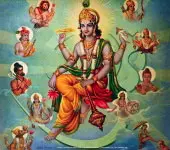In the 5th mantra of the dwitiya valli of the first chapter of Kathopanishad, Yamaraja is describing the sad state of affairs in the spiritual world.
अविद्यायामन्तरे वर्तमानाः स्वयं धीराः पण्डितंमन्यमानाः ।
दन्द्रम्यमाणाः परियन्ति मूढा अन्धेनैव नीयमाना यथान्धाः ॥
avidyayamantare vartamanah svayam dhirah panditammanyamanah .
dandramyamanah pariyanti mudha andhenaiva niyamana yathandhah ..
Meaning: Living in the midst of ignorance, thinking themselves to be wise and learned, the deluded ones wander about, like the blind led by the blind.
What is Avidya?
Avidya refers to ignorance and incorrect knowledge, especially the lack of true spiritual understanding. It is darkness that leads people away from truth, making them blind to reality. This ignorance not only includes a lack of knowledge but also embracing false beliefs, which causes confusion and misguides people. Just as darkness prevents sight, Avidya prevents wisdom, leading people to wander aimlessly without understanding the true nature of existence.
The foolish blind followers
The minds of the blind followers are clouded by ignorance and false knowledge which prevents them from seeing reality clearly. Just as blind men rely on others to lead them, foolish people follow others blindly accepting false guidance. This results in wandering aimlessly through life, making mistakes and wrong choices without even realizing the errors in their beliefs or actions.
The danger of blind faith
Blind faith causes people to accept false gurus without questioning their credibility or knowledge. These so-called gurus present themselves as wise and enlightened, claiming to possess spiritual authority. However, they are ignorant themselves, lacking true understanding of the teachings they profess. Because their followers do not critically examine or challenge their teachings, these gurus lead them deeper into ignorance and confusion. Instead of guiding them toward truth and wisdom, they provide false beliefs and misconceptions. As a result, both the followers and the gurus remain trapped in a cycle of ignorance, far from genuine spiritual growth and understanding.
How Shastras are misused
The Shastras are intended to guide us by offering true spiritual knowledge and wisdom. They provide a foundation for understanding life's deeper truths and following a righteous path. However, when false gurus either misunderstand the teachings or misuse them for personal gain, they misinterpret the Shastras. This leads to distorted beliefs and incorrect practices, steering individuals away from the intended spiritual guidance, and resulting in confusion, ignorance, and the spread of false ideas.
What do false gurus say
They argue that, just like the authors of the scriptures, we too are human and possess reasoning abilities given by God. They declare themselves as gurus and falsely claim expertise in the scriptures. Ignorant followers, lacking true understanding, blindly follow them, believing them to be knowledgeable. As a result, these misled followers end up lost, neither following the true spiritual path nor achieving worldly success, trapped in confusion and ignorance.
False gurus misuse the Vedas and Shastras by pretending to be knowledgeable in it. They deceive others by claiming authority over the Vedas, but they lack true understanding and mislead their followers.
Why following Shastras is important
Some false gurus claim that scriptural guidance is unnecessary for spiritual enlightenment, promoting the idea that merely listening to one’s inner voice, contemplation, or intelligence is sufficient. They argue that personal insight and self-reflection alone can lead to truth and spiritual growth. This approach is misleading because individual perception is limited by ignorance (Avidya), emotions, and ego. Without proper guidance, it is easy to misinterpret or overlook essential truths.
Scriptures like the Vedas, Upanishads, and Gita serve as timeless sources of wisdom, carefully preserved to convey spiritual knowledge. They offer the collective experiences and insights of ancient sages, who attained enlightenment through rigorous spiritual practices, devotion, and divine wisdom. These texts serve as roadmaps to prevent us from getting lost in self-created illusions and misconceptions.
Without scriptural guidance, personal contemplation can fall prey to ego-driven interpretations. A person might mistake their desires or preferences for spiritual truth. The mind can easily rationalize actions or beliefs that are convenient, but not necessarily aligned with spiritual reality. Scriptures, however, provide a tested framework that ensures we stay on the path of dharma (righteousness) and avoid delusions.
False gurus, by dismissing scriptures, encourage followers to rely on incomplete or flawed reasoning. This often leads to confusion, superficial spirituality, and ego-driven decisions, rather than true enlightenment, which requires self-discipline, surrender, and adherence to divine truths presented in the Shastras.. Shastras guide us beyond personal biases to universal truths that are essential for deep spiritual transformation.
Comments
Read more comments
Knowledge Bank
Does a bhakta have to give up worldly and scriptural duties?
Not necessarily; he would rather change every kind of duty as service to Bhagavan. For him, every task is an opportunity to serve Bhagavan.
The Divine Origin and Authority of the Vedas
'Dharma' (righteousness) is established by the Vedas, and 'Adharma' (unrighteousness) is its opposite. The Vedas are considered a direct manifestation of Sri Hari, with Bhagavan being the first to proclaim them. Therefore, scholars who understand the Vedas assert that the Vedas embody the essence of Sri Hari. This underscores the belief in the divine origin and authority of the Vedas, highlighting their role in guiding humanity towards righteousness.
Recommended for you
What does Veda say about the inheritance rights of daughters?

Do you know who gives light to Sun?

Shiva Mangala Stuti

bhuvane sadoditam haram girisham nitaantamangalam. shivadam bhujangamaalinam bhaja re shivam sanaatanam. shashisooryavahnilochanam sadayam suraatmakam....
Click here to know more..